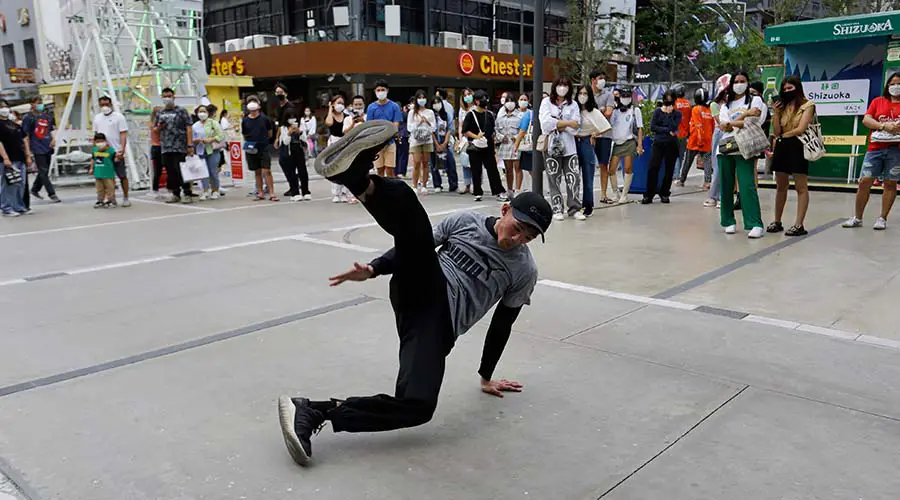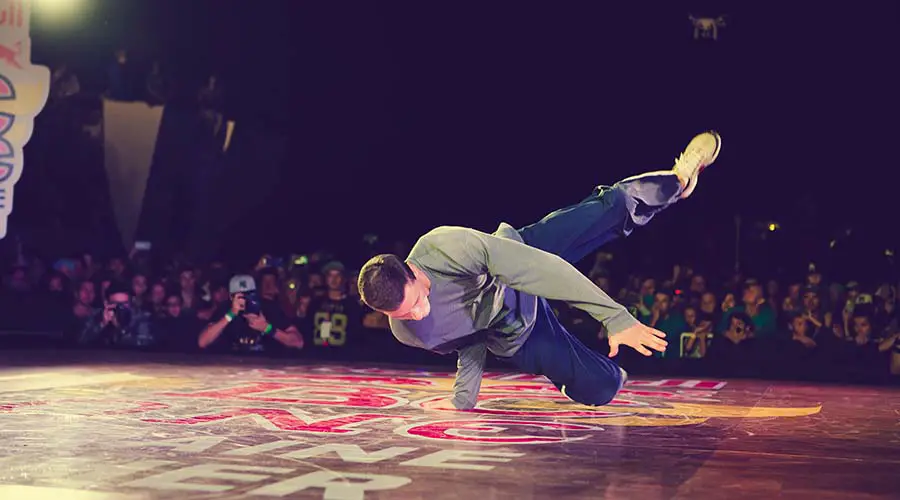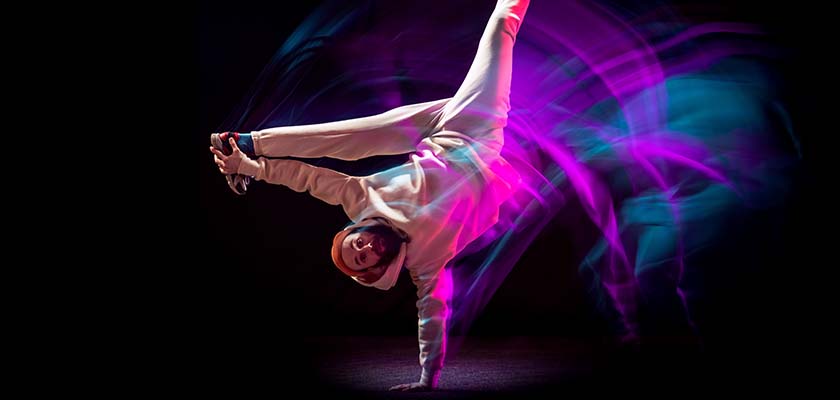The breakdance is a sport that involves a lot of skill, technique and rhythm. But did you know that there are different types of breaking? That’s right!
The sport, which is part of hip hop culture and originated in the 1970s in the United States, more specifically in the Bronx area of New York, can be categorized into various disciplines;
Here, we’ll talk a little more about the types of breaking, are you ready to get to know them?
Check out 👇
Types of breaking: learn about the main moves performed by dancers

The types of breaking can be classified according to the moves performed by the B-Boys and B-Girls, the great athletes in this sport. Among them, the following acrobatics stand out:
- Toprock;
- Footwork;
- Freezer;
- Power Moves;
- Drops.
Toprock
The toprock moves are those performed standing up and usually function as the introduction to a breakdance performance.
In this type of breaking, athletes usually do dance moves that help introduce their style into the performance. They also act as a transition before moving on to other even more complex moves, which involve floor movements, acrobatics and calculated falls;
Footwork
In footwork, athletes move on the floor, using their hands and feet to create fast, fluid movement patterns.
Footwork is a fundamental part of breaking and usually involves rapid transitions between different steps and acrobatics, making the duel more dynamic and impressive for spectators.
Freezes
Freezes are the static positions held during a breaking performance. In this type of breakdance, the B-Boy or B-Girl assumes a dramatic pose and holds that pose for a period of time;
Thus, among the types of breaking, the freeze is used to add style and emphasis to the performance. More than that, to show that the athlete has enough skill and strength to remain static in the same position for a period of time
All this proves that breakdancing is not just about movement, but also about discipline and strength!
Power moves
Power moves are the movements that make breaking even more dynamic for spectators. This is because they involve acrobatic steps with spins, rotations and other impressive skills by the athletes.
Some examples of power moves that are very successful in the world of breakdancing are: windmills, flare, airflare, headspin, among others. Finally, it’s worth remembering that these moves require a lot of training, strength, balance and coordination to be performed successfully.
Drops
Last on the list of types of breaking, we have the drops, which are those movements in which the B-Boys or B-Girls fall and/or throw themselves to the ground in a dramatic way, creating a visual and emotional impact to the performance.
They can be used at the end of the duel or, also, according to the beat of the music, using it to your advantage to make a drop at an unexpected moment.
Uniting the types of breaking in one performance
Although there are different types of breaking, it’s up to the athlete to decide how to put together their presentation. This way, they can put all the different types of breaking dance into the same duel, as long as they follow the rules of the competition;
In fact, among the main rules of breakdancing, there are two that cannot be disobeyed under any circumstances:
- The importance of respecting your opponent, since you can’t touch them under any circumstances;
- Do not exceed the stipulated time for each battle to take place, ensuring that the performance does not overrun the timer;
The performance time can vary depending on the competition. However, in the 2024 Olympics, for example, the performance must be a maximum of 60 seconds per round.
Types of breaking: related dances
Breaking is a discipline that is part of hip hop culture and street dance as a whole. However, in addition to breakdancing, there are also other dance styles that are part of this very important urban culture.
So let’s find out a bit more about these other types of street dance? Take a look!
- Popping;
- Locking;
- Waacking;
- House dance;
- Krumping;
- Hip hop freestyle.
Popping
Created in California in the 1970s, popping is that dance known for having a robotic aesthetic. To achieve this, it is characterized by fast and distinctive muscle contractions, called “pops” or “hits”.
The dancers usually perform movements in which they isolate specific parts of the body, creating this “futuristic” impression;
Locking
Another dance style that also originated in the 1970s, locking was created by Don Campbell and is known for being a fun style, featuring expressive movements, big smiles – or grimaces – and dramatic pauses.
The dancers usually perform locking to the sound of funk and soul music, which has beats full of “soul” and inspires movements full of energy and expression.
Waacking
Waacking is another style of hip hop dance that emerged in the United States in the 1970s, more specifically in the Los Angeles LGBTQIA+ underground scene.
Characterized as a dance full of energy, it relies on fast and precise arm movements and dancers often use leques or scarves to emphasize the steps and create a more expressive and dynamic look.

House Dance
Moving on to the next decade, the 1980s, we have the emergence of a new dance style that is also part of hip hop culture: House Dance. Originating in the nightclubs of Chicago and New York, House moves are fluid, with movements that follow the beats of house music;
Dancers often incorporate fast footwork, spins and stylized poses to accompany the music.
Krumping
In the 1990s, another style of hip hop dance gained ground: Krumping. Originating in Los Angeles, this is an intense and expressive form of dance, characterized by aggressive and emotional movements;
In Krumping, it’s common for dancers to wear dramatic face make-up and flashy clothes to emphasize their artistic expression.
Hip Hop Freestyle
Last but not least, Hip Hop Freestyle is a form of improvised dance in which the dancers create spontaneous movements according to the rhythm and/or beat of the music, letting out what they are feeling.
There are no predefined moves, which allows for great creative freedom and more individuality on the dance floor.
So, did you like learning more about the types of breaking and other disciplines that are part of hip hop culture?
Keep following our website to stay on top of the main information related to the world of sports and games! 💪



